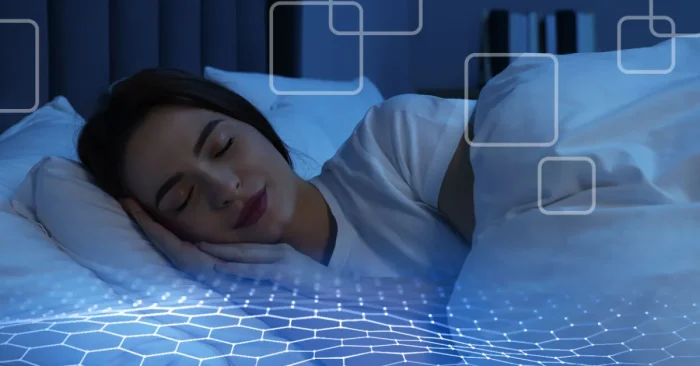Overview
AI tools for sleep analysis are revolutionizing the way individuals and healthcare providers monitor and improve sleep patterns. These tools use artificial intelligence, machine learning, and data analytics to track sleep stages, detect disturbances, and provide personalized recommendations.
AI-powered devices and software analyze data from wearables, smart beds, and sensors to measure parameters such as heart rate, breathing, movement, and brain activity. By interpreting complex sleep data, AI tools help identify sleep disorders like insomnia, sleep apnea, and restless leg syndrome. They also provide actionable insights to optimize sleep quality, enhance overall health, and support better lifestyle choices. Widely used by consumers, sleep clinics, and researchers, AI-driven sleep analysis enables a deeper understanding of sleep patterns and contributes to improved well-being.
1. SleepScore – AI Sleep Monitoring
SleepScore uses AI algorithms to analyze sleep patterns through non-contact sensors or wearables. It tracks sleep stages, duration, and quality, providing personalized recommendations to improve rest. The platform detects disturbances, offers actionable insights, and helps users optimize their sleep routines. By integrating AI, SleepScore enhances understanding of sleep behaviors and promotes better sleep hygiene for overall health and wellness.
2. Eight Sleep – AI Smart Mattress
Eight Sleep combines AI with smart mattresses to monitor and enhance sleep. Sensors embedded in the mattress track movement, heart rate, and temperature. AI algorithms analyze this data to provide sleep scores, personalized insights, and recommendations. The platform can adjust bed temperature automatically to optimize sleep quality. Eight Sleep helps users improve rest, prevent sleep disturbances, and adopt healthier sleep habits through AI-driven insights.
3. Withings Sleep – AI Sleep Tracker
Withings Sleep leverages AI to monitor sleep cycles, heart rate, and breathing patterns using a non-intrusive sleep mat. AI algorithms detect sleep apnea, snoring, and restlessness, generating detailed reports. The platform provides personalized guidance to enhance sleep quality. By using AI, Withings Sleep enables individuals to track sleep trends, address issues proactively, and maintain healthier sleep routines over time.
4. Oura Ring – AI Wearable Sleep Tracker
Oura Ring uses AI to analyze sleep data collected from wearable sensors, including heart rate variability, body temperature, and movement. The AI algorithms evaluate sleep stages, detect disturbances, and provide personalized recommendations. Oura Ring helps users understand sleep quality, improve routines, and make lifestyle adjustments for better rest. AI-driven insights from Oura Ring support overall health and recovery optimization.
5. SleepScore Max – AI Sleep Analysis Device
SleepScore Max integrates AI to provide precise sleep analysis without physical contact. Its sensors measure movement, breathing, and heart rate, while AI algorithms detect sleep stages and disorders. The platform generates personalized recommendations to enhance sleep quality. By leveraging AI, SleepScore Max helps users monitor progress, prevent sleep issues, and adopt healthier sleep habits based on accurate and actionable insights.
6. ResMed – AI Sleep Solutions
ResMed uses AI to monitor sleep patterns, particularly for individuals with sleep apnea. Its devices analyze breathing, oxygen levels, and movement during sleep. AI algorithms detect irregularities and generate personalized insights for treatment and lifestyle adjustments. ResMed helps improve sleep quality, supports therapy adherence, and assists healthcare providers in managing sleep disorders efficiently using AI-driven analysis.
7. Philips SmartSleep – AI Sleep Coaching
Philips SmartSleep combines AI with wearable and bedside devices to track sleep patterns and provide personalized coaching. AI algorithms analyze sleep stages, disturbances, and lifestyle factors affecting rest. The platform offers actionable recommendations and guided exercises to enhance sleep quality. By integrating AI, Philips SmartSleep supports users in achieving restorative sleep and better overall well-being through data-driven insights.
8. Dreem – AI Sleep Headband
Dreem uses AI-integrated headbands to monitor brain activity, heart rate, and movement during sleep. AI algorithms detect sleep stages, identify disturbances, and provide personalized feedback to improve sleep quality. The platform also offers guided audio programs to enhance deep sleep. By leveraging AI, Dreem helps users optimize rest, address sleep issues, and adopt healthier nighttime routines based on real-time analysis.
9. NightBalance – AI Sleep Apnea Therapy
NightBalance uses AI to monitor and treat positional sleep apnea. Its wearable device tracks body position and sleep quality, while AI algorithms provide feedback to reduce apnea events. The platform generates reports and recommendations to improve breathing patterns and sleep efficiency. By integrating AI, NightBalance supports effective therapy, reduces sleep disruptions, and enhances overall sleep quality.
10. Beddit – AI Sleep Monitoring
Beddit leverages AI to track sleep metrics, including heart rate, breathing, and movement, via a thin sensor strip placed under the mattress. AI algorithms analyze sleep stages, detect disturbances, and generate insights for personalized recommendations. Beddit helps users monitor trends, optimize sleep routines, and improve overall rest. AI-driven analysis ensures accurate, actionable feedback for better sleep hygiene and health outcomes.
(FAQs)
Q1: How do AI tools improve sleep analysis?
AI tools analyze sleep stages, detect disturbances, and provide personalized recommendations, enhancing sleep quality, efficiency, and overall health.
Q2: Are AI sleep analysis tools suitable for all users?
Yes, platforms like SleepScore, Oura Ring, and Eight Sleep are designed for individuals, sleep clinics, and researchers to monitor and improve sleep patterns.
Q3: Can AI tools help identify sleep disorders?
Absolutely, AI algorithms detect sleep apnea, insomnia, restless leg syndrome, and other disturbances, enabling timely intervention and better sleep management.
Learn More About AI Course https://buhave.com/courses/learn/ai/






